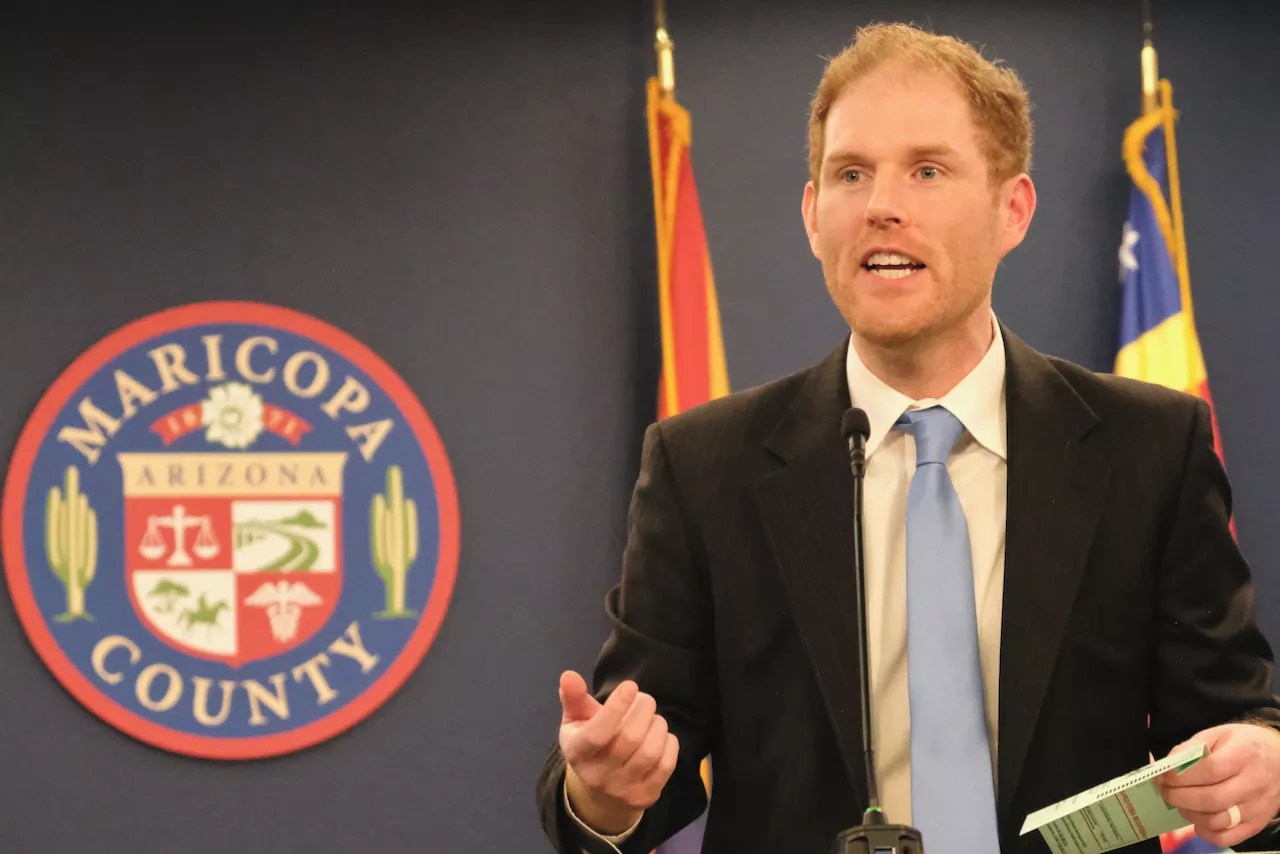
Gage Skidmore/Flickr/CC BY-SA 2.0

Audio By Carbonatix
When election conspiracy theorist Dinesh D’Souza released his so-called documentary “2000 Mules” two years ago, most people with decent critical thinking skills recognized it as a slipshod falsity. The film’s claims about widespread voter fraud to “steal” the 2020 election, in Arizona and other swing states, hardly stood up to scrutiny.
Now, D’Souza is forced to agree. Thanks to an ongoing defamation suit against him, the right-wing filmmaker has posted an apology message and admitted to one of the film’s crucial flaws.
“I make this apology not under the terms of a settlement agreement or other duress, but because it is the right thing to do, given what we have now learned,” D’Souza said.
The film depicts an organized group of “mules” that D’Souza claimed illegally gathered large amounts of ballots to bring them to voting drop boxes to sway the 2020 election for Joe Biden. While its claims have been largely criticized and debunked, it’s received an audience in Arizona and beyond.
After the release of “2000 Mules,” staff from the organization True the Vote, which provided much of the data for the film, visited Arizona state legislators and other politicians to share their findings at the start of the 2022 legislative session. Those present included now-outgoing U.S. Rep. Debbie Lesko, Pinal County Sheriff Mark Lamb and state Sen. Wendy Rogers.
While Republican state officials and politicians supported the film upon its release, its narrative wasn’t uncontested. In October 2022, the office of then-Arizona Attorney General Mark Brnovich, a Republican, asked the FBI to investigate True the Vote after the right-wing organization had ignored Brnovich’s request to share the documentary’s evidence.
That evidence, D’Souza now acknowledges, was bad. In an apology posted on Nov. 28, D’Souza admitted that one basis for the film’s claims – the supposed geolocation data and surveillance video of drop boxes – was flawed.
The documentary included surveillance footage of a ballot box in downtown Phoenix where it alleged that mules cast extra ballots. True the Vote claims that 200 people in the Grand Canyon State made an average of 20 ballot deposits each at drop boxes.
“We recently learned that surveillance videos used in the film may not have actually been correlated with the geolocation data,” D’Souza wrote on his website.

For four years, Maricopa County Recorder Stephen Richer patiently combated election conspiracy theories on X, formerly known as Twitter.
Katya Schwenk
Defamation suit
However, it doesn’t seem like D’Souza is clearing the air out of the goodness of his heart. In 2022, Georgia voter Mark Andrews, who was featured in the documentary, filed a defamation lawsuit against the filmmaker.
In the movie, Andrews, with his faced blurred is shown placing ballots into a drop box while a voiceover called his actions a “crime.” However, what Andrews was doing was completely legal, and he wasn’t a mule. Per a state investigation, Andrews was legally dropping off the ballots belonging to him and his family members, who all lived at the same address.
The clips of Andrews’ blurred face were used in promotional materials on other conservative sites, including a show hosted by Phoenix-based right-wing organizer Charlie Kirk, the founder of Turning Point USA.
“I owe this individual, Mark Andrews, an apology,” D’Souza wrote in his statement. “I now understand that the surveillance videos used in the film were characterized on the basis of inaccurate information provided to me and my team.”
Others are still waiting for their mea culpas. Outgoing Maricopa County Recorder Stephen Richer, a centrist Republican who battled election conspiracy theories for four years, is one of them.
“I’m now accepting apologies on this nonsense theory,” Richer wrote on X after a brief hiatus from the platform. “And honestly, if at this point you can’t admit that you were hoodwinked by this fraud (which doesn’t make you a bad person!), then maybe consider that you never will no matter what.”
Richer shouldn’t hold, and probably isn’t holding, his breath. D’Souza still stands behind his film’s larger message, claiming that the team behind the documentary “operated in good faith.”
“The 2020 election was not the ‘most secure election in US history’ – far from it!” D’Souza wrote.